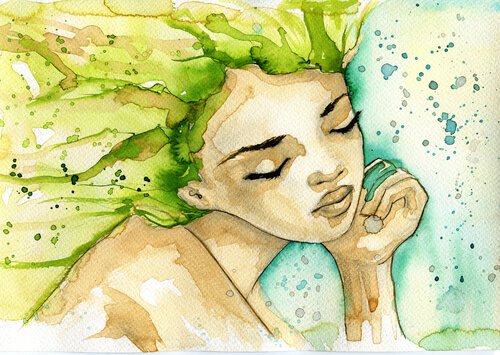The Attractiveness of What's Forbidden

From the story we were told about Adam and Eve in paradise, it seems that throughout human evolution, the forbidden has always been very attractive.
In different interpersonal relationships prohibition generates different reactions. But very often, instead of serving to deter us, a ban generates an attraction to that which we are forbidden.
“The mistake was prohibiting the apple. If they had prohibited the serpent, Adam would have eaten the serpent.”
-Anonymous-
To understand the psychology of attraction to those things that are prohibited, it is important to understand psychological development from childhood.
The instinct of curiosity during childhood
Since we were children, curiosity has led us to discover the world, to be interested in what surrounds us and to experiment with new things. This certainly is part of the human learning experience from as early as infancy.

We could say that it is a basic instinct to learn, grow, mature and survive. That’s why, nothing and no one can stop us in our childhood from liking to explore, experience things firsthand, and discover new things.
At this stage, prohibition becomes a very intense curiosity about knowing what lies beyond the known, and therefore, becomes very attractive and almost irresistible.
Instead of banning, generate alternatives
During childhood, what is not named does not exist, or at least, is not interesting.
If we want to get a child to stay away from a particular location, it would not be advisable to insist they not go. Rather, we should create alternatives that gently nudge them toward what we do want them to do to make it attractive.
Adolescence, a time of self-affirmation
In adolescence, young people need self-affirmation of who they are while at the same time they are getting to know and discover themselves. To do this, it is necessary during this juvenile stage to differentiate themselves from parental patterns by highlighting their own ideas and defining their own path.
In this process the character and incipient personality of the childhood stage matures, and young people need their own space and need to make their own decisions in order to feel like they are someone clearly different from their parents.
At this stage, seeking after that which is forbidden is often a way for them to differentiate themselves from the ideals ingrained since childhood, which now are not useful. Therefore, what is forbidden becomes more attractive, and we look for whatever will differentiate us and reaffirm that we are someone different and unique.
Instead of prohibition, negotiation
When we want to prevent an adolescent from not doing something, it is advisable to explain and define the motives and values of that wrong choice. This is done by always showing respect for their individuality as a person, their opinion and their decision. Since, in many cases, learning through their own mistakes is inevitable.
If this is the case, we may seek to reach an agreement, negotiating for both sides, something beneficial for adult and the adolescent.

And in any case it is important to note that as much as we prohibit them, if a teen wants to do something, they have many ways of doing it. Thus, communication is essential.
Freedom to be an adult
Adulthood is the stage of freedom, maturity, responsibility and commitments. It is where the adult decides his or her plan in life freely, independent from their parents and making personal decisions that effect their passage through life.
From this point forward, no one has the right to choose our path. And at this stage, prohibition generates rejection of the person who imposes it. Adults may be attracted to what is “off limits” out of a desire to show the world that we are the masters of our lives, and that nothing can or should decide for us.
Instead of prohibiting, respect
Every adult has the right to decide his or her life, even if it is wrong. Therefore, people who are close to them have no other choice but to respect their decision. Of course, they can also express their opinions with respect, without prohibiting, without judgment, without threats or criticism.
From the story we were told about Adam and Eve in paradise, it seems that throughout human evolution, the forbidden has always been very attractive.
In different interpersonal relationships prohibition generates different reactions. But very often, instead of serving to deter us, a ban generates an attraction to that which we are forbidden.
“The mistake was prohibiting the apple. If they had prohibited the serpent, Adam would have eaten the serpent.”
-Anonymous-
To understand the psychology of attraction to those things that are prohibited, it is important to understand psychological development from childhood.
The instinct of curiosity during childhood
Since we were children, curiosity has led us to discover the world, to be interested in what surrounds us and to experiment with new things. This certainly is part of the human learning experience from as early as infancy.

We could say that it is a basic instinct to learn, grow, mature and survive. That’s why, nothing and no one can stop us in our childhood from liking to explore, experience things firsthand, and discover new things.
At this stage, prohibition becomes a very intense curiosity about knowing what lies beyond the known, and therefore, becomes very attractive and almost irresistible.
Instead of banning, generate alternatives
During childhood, what is not named does not exist, or at least, is not interesting.
If we want to get a child to stay away from a particular location, it would not be advisable to insist they not go. Rather, we should create alternatives that gently nudge them toward what we do want them to do to make it attractive.
Adolescence, a time of self-affirmation
In adolescence, young people need self-affirmation of who they are while at the same time they are getting to know and discover themselves. To do this, it is necessary during this juvenile stage to differentiate themselves from parental patterns by highlighting their own ideas and defining their own path.
In this process the character and incipient personality of the childhood stage matures, and young people need their own space and need to make their own decisions in order to feel like they are someone clearly different from their parents.
At this stage, seeking after that which is forbidden is often a way for them to differentiate themselves from the ideals ingrained since childhood, which now are not useful. Therefore, what is forbidden becomes more attractive, and we look for whatever will differentiate us and reaffirm that we are someone different and unique.
Instead of prohibition, negotiation
When we want to prevent an adolescent from not doing something, it is advisable to explain and define the motives and values of that wrong choice. This is done by always showing respect for their individuality as a person, their opinion and their decision. Since, in many cases, learning through their own mistakes is inevitable.
If this is the case, we may seek to reach an agreement, negotiating for both sides, something beneficial for adult and the adolescent.

And in any case it is important to note that as much as we prohibit them, if a teen wants to do something, they have many ways of doing it. Thus, communication is essential.
Freedom to be an adult
Adulthood is the stage of freedom, maturity, responsibility and commitments. It is where the adult decides his or her plan in life freely, independent from their parents and making personal decisions that effect their passage through life.
From this point forward, no one has the right to choose our path. And at this stage, prohibition generates rejection of the person who imposes it. Adults may be attracted to what is “off limits” out of a desire to show the world that we are the masters of our lives, and that nothing can or should decide for us.
Instead of prohibiting, respect
Every adult has the right to decide his or her life, even if it is wrong. Therefore, people who are close to them have no other choice but to respect their decision. Of course, they can also express their opinions with respect, without prohibiting, without judgment, without threats or criticism.
This text is provided for informational purposes only and does not replace consultation with a professional. If in doubt, consult your specialist.







